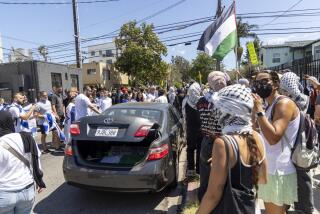Occupy L.A.: Free speech is free
With the Occupy L.A. encampment dismantled, the city is left with the task of refurbishing the battered grounds of City Hall and tallying up the costs of the occupation. Officials estimate the city spent
$1.7 million in overtime for police enforcement. Graffiti must be removed from three monuments. And it could cost $400,000 to repair the irrigation system and replace the lawn (if the city upgrades to desertscaping). These are not insignificant figures, but suing the Occupy L.A. protesters to foot the bill — an option, according to City Atty. Carmen Trutanich — is wrong.
From a practical perspective, it seems impossible to pinpoint who is responsible for what damage. From a legal standpoint, the city seems unlikely to recoup its police overtime costs. And as a matter of plain fairness, it is contradictory given the city’s own actions. The City Council passed a resolution supporting the “continuation of the peaceful and vibrant exercise in 1st Amendment rights” by the occupiers; Council President Eric Garcetti told them to stay as long as they liked; and Mayor Antonio Villaraigosa passed out ponchos during the first rains. Given all that, how can Trutanich turn around and present them with a bill?
The protesters did sue first, notes William Carter, Trutanich’s chief deputy. In three lawsuits, groups representing the occupiers alleged civil rights violations before they were evicted, asking the courts for an injunction against eviction and for costs associated with their suits as well as any other relief deemed appropriate. Any time the city is sued, its attorneys consider countersuing, according to Carter.
Still, there is something unseemly about charging people for exercising their 1st Amendment rights on public property, even if that protest was confrontational or illegal. Would we have expected the federal government to charge Martin Luther King Jr. and the Southern Christian Leadership Conference for trampling the grass on the National Mall during the 1963 March on Washington?
On balance, the Occupy L.A. demonstration was carried out by a nonviolent group that did not seriously damage City Hall itself. The protesters broke no windows, stormed no doors — and when they were forced out, they either left or surrendered to arrest with little resistance. They had their say, and now the city has its frontyard back. At this point, there appears to be scant need for legal action from either side. But whether or not the protesters drop their lawsuits, the City Council should drop any thought of trying to get its money back. That’s one cost a city must bear for being open to all.
More to Read
A cure for the common opinion
Get thought-provoking perspectives with our weekly newsletter.
You may occasionally receive promotional content from the Los Angeles Times.










